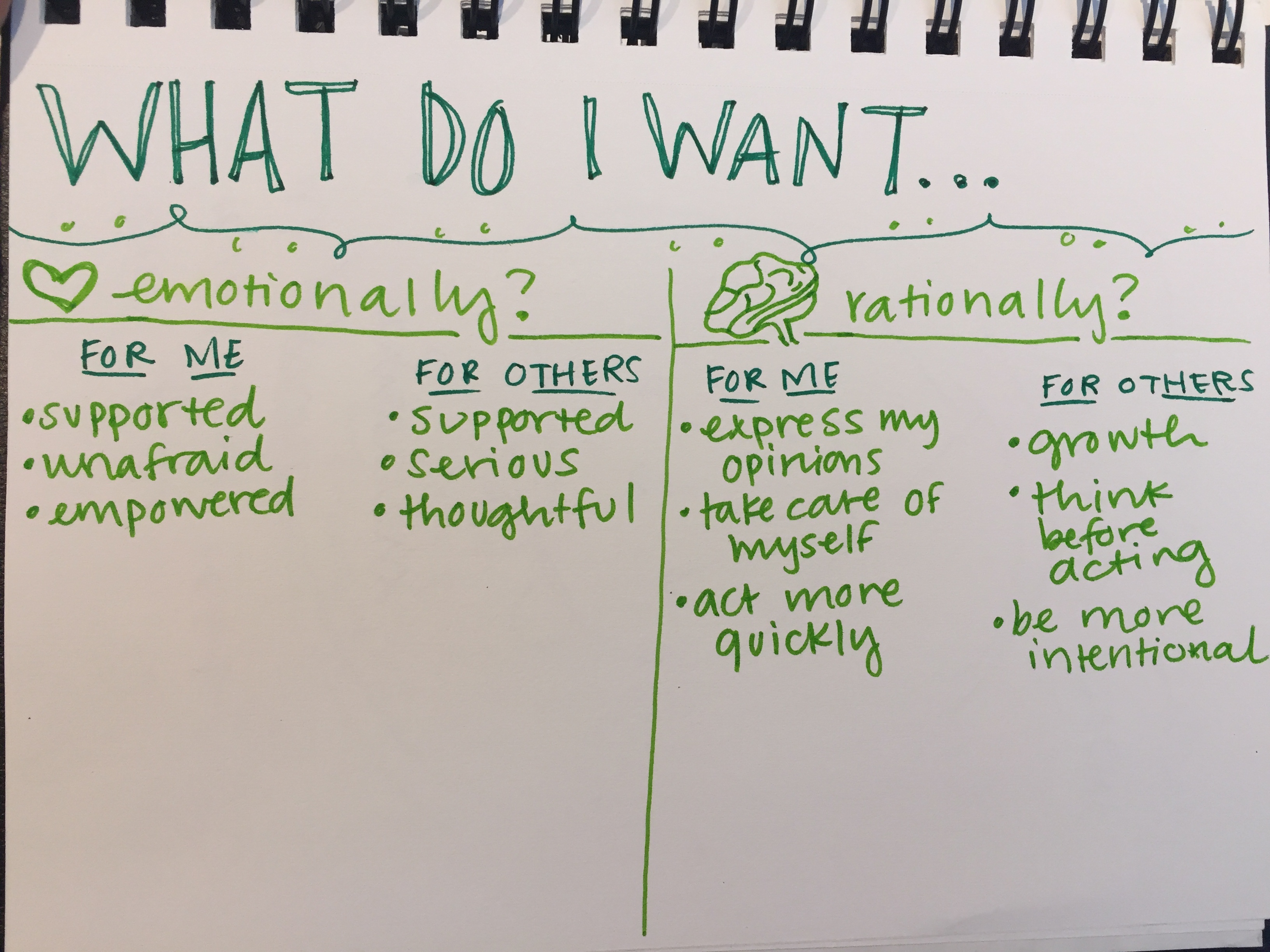
Hello!
In this Illuminate series, we’ll be exploring each of the learnable competencies of the Six Seconds Emotional Intelligence Model. This is week two: Apply Consequential Thinking.
Choose what’s most true for you:
When I am triggered emotionally, I tend to:
a. fight
b. flee
c. freeze
d. pause, decide, then act
This week’s competency of Apply Consequential Thinking encourages you to explore what choosing option D feels like. You will think of a current choice you need to make, then use a personal activity to explore how you want yourself and others to be affected by your choice.
Illuminate: How to Make A Decision Based on What You Really Want


Applying Consequential Thinking is all about being intentional with your actions. It’s about taking that micro-pause to stop and think about where you really want to go before reacting on autopilot.
The next time you make a choice, how would it feel to really know what you want to have happen?
Rather than fighting, fleeing, or freezing, I invite you to take a pause with me to explore how you really want to respond to a certain situation. The chart you’ll use below will help you unravel the affects you want to make, both emotionally and rationally, based on your choice.
You’ll do this by asking yourself two simple questions:
What do I want emotionally?
and
What do I want rationally?
Find a piece of paper and a pen (or markers, crayons, colored pencils) + activate your power to apply consequential thinking…

1. Think of a current decision you want to make. If you want help considering one, you might revisit a pattern you identified last week. Maybe it’s a decision on a job, how to respond to someone you care about, or a financial situation. For example, my choice is around how to express my needs in a sticky situation.
2. Next, make your chart of what YOU want emotionally and rationally from your decision. Ask yourself: What do I want emotionally for myself and others? What do I want rationally? For example, a few of the emotions I identified for myself are: supported, unafraid, and empowered. A few of the rational outcomes I identified for myself are: express my opinions, take care of myself, and act more quickly. Make a chart for yourself like this one:

3. Time to make an intentional action. Now that you’ve explored what you want out of your decision, what action sounds the most aligned with your list?
REFRESH + RENEW EVERY MONDAY WITH ILLUMINATE IN YOUR INBOX!

How did it feel to clarify the outcomes you want from your decision?
What was one insight you had from this activity? How might you apply that insight ‘in the moment’?
PS- if you’d like to practice ACT more with some 1-1 support, I am doing my Coaching Certification through Six Seconds, and my cohort and I are offering super-discounted coaching sessions to get all of our practice hours needed for certifications. Find out more here!

Illuminate is a weekly e-mail series that provides practical tips + galvanizing inspirations for practicing an emotionally intelligent life. In our time together, we’ll operate from the assumption that you have all the wisdom you need inside of yourself + that you have a purpose the world needs to see. We will explore the tools + techniques to illuminate your own inner wisdom and purpose. If you’d like to receive this free gift of goodness in your inbox every week, subscribe here.
- Identify Your Most Fulfilling Career: A Step-by-Step Guide for Women - March 21, 2022
- POP-UP Festival Partnership with AEON Corporation - March 9, 2022
- 3 Interview Tips for Women from an Executive Emotional Intelligence Coach - February 9, 2022

Hi Maria,
Emotional intelligence is so important for the people I work with. These are people who grew up with one or both parents with a serious mental illness. Most of my work is based on my (easy to read) research entitled: “Lives unseen: unacknowledged trauma of non-disordered, competent Adult Children Of Parents with a Severe Mental Illness”. See:
https://minerva-access.unimelb.edu.au/handle/11343/37852
My website link shows comments from readers of my research. Scroll down for various other pages, such as “Tips”, “Grief & Loss” (includes a Japanese translation), “Tasks”, etc.
I also wrote some brief articles on grief and trauma which can be located here: https://medium.com/@suzette.misrachi (For a brief idea of what my research is about, scroll down to the first article entitled “An unacknowledged trauma: The adult legacy of growing up with a mentally ill parent”). If people click “Follow” on the above link they will get these short articles automatically (they come out only 3x per year).
I really like the ideals and the purpose of your work. Thanks for sharing.
Kind regards, Suzette